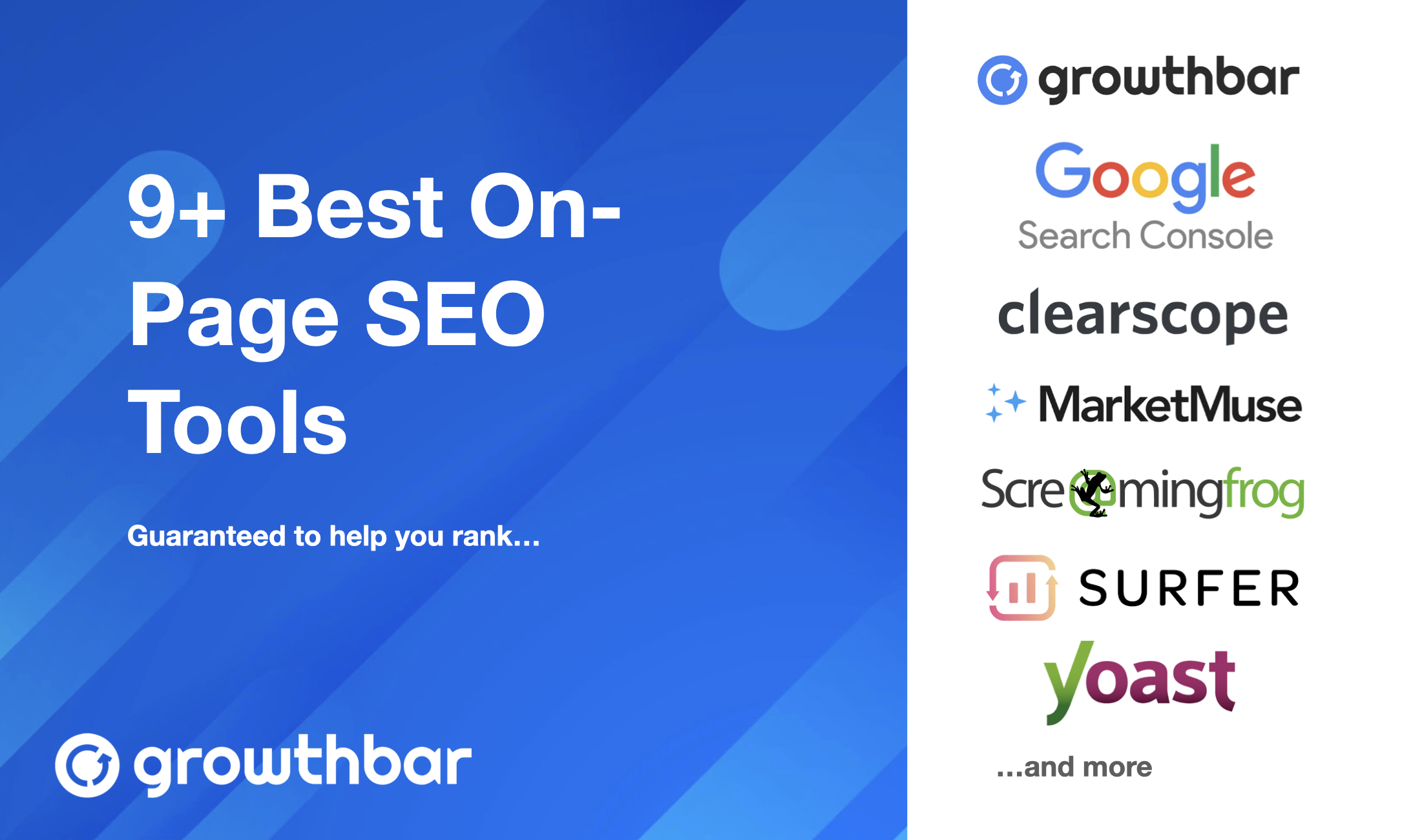In the world of digital marketing, on-page SEO is crucial. It helps your website rank higher on search engines.
On-page SEO tools are essential for optimizing your website’s content and structure. These tools analyze your site’s elements, such as keywords, meta tags, and headings, to ensure they meet search engine guidelines. By using these tools, you can improve your site’s visibility and attract more organic traffic.
In this blog post, we will explore the importance of on-page SEO tools and how they can benefit your website. Whether you’re a beginner or an experienced marketer, understanding these tools will enhance your SEO strategy. Stay with us as we dive into the world of on-page SEO and discover the tools that can make a difference.

Credit: loganix.com
Introduction To On Page Seo
On Page SEO is a critical aspect of search engine optimization. It involves optimizing individual web pages to rank higher. This helps drive relevant traffic from search engines. By focusing on On Page SEO, you ensure your content is both user-friendly and search engine-friendly.
Importance Of On Page Seo
On Page SEO plays a vital role in your website’s success. It helps search engines understand your content. This improves your chances of ranking higher in search results.
- Better visibility: Improved rankings lead to more visibility.
- Increased traffic: Higher visibility means more visitors.
- User experience: Optimized pages provide a better user experience.
Key Elements Of On Page Seo
Several key elements contribute to effective On Page SEO. These elements ensure your content is optimized for search engines.
| Element | Description |
|---|---|
| Title Tags | Titles should be clear and include keywords. |
| Meta Descriptions | Summarize your page with a compelling meta description. |
| Headings | Use H1, H2, H3 tags to structure your content. |
| URL Structure | URLs should be short and keyword-rich. |
| Keyword Usage | Include relevant keywords naturally in your content. |
| Image Optimization | Use alt tags and compress images for faster loading. |
By focusing on these key elements, you can improve your On Page SEO efforts. This leads to better rankings, more traffic, and a better user experience.
Keyword Research Tools
Keyword research tools play a vital role in on-page SEO. They help identify the best keywords for your content. Using these tools can significantly boost your search engine rankings. Keywords are crucial for driving organic traffic to your site. Let’s explore some key aspects of keyword research tools.
Finding Relevant Keywords
Finding relevant keywords is the first step in keyword research. Keyword research tools provide a list of potential keywords. These keywords are based on search volume and relevance. Use these tools to identify terms your audience searches for. Focus on keywords with high search volume and low competition. This will help you rank higher on search engines.
Analyzing Keyword Competition
Analyzing keyword competition is equally important. Keyword research tools show how competitive a keyword is. High competition means many sites target that keyword. Low competition means fewer sites target it. Aim for a balance between search volume and competition. This strategy helps you find keywords that are easier to rank for. It also ensures your content reaches the right audience.
Content Optimization Tools
Content optimization tools help you enhance your website’s content for better search engine ranking. These tools analyze your content and give suggestions to improve readability, keyword usage, and overall quality. Using these tools can make a big difference in how your content performs online.
Improving Content Quality
Quality content attracts more visitors and keeps them engaged. Content optimization tools help you write clear and concise content. They offer suggestions to improve grammar, sentence structure, and readability. Tools like Grammarly and Hemingway Editor can be very helpful. They catch errors and make your content easy to read. This ensures that your message is clear and understood by your audience.
Using Lsi Keywords
LSI (Latent Semantic Indexing) keywords are related terms that help search engines understand your content. Using LSI keywords can improve your content’s relevance and ranking. Content optimization tools can suggest LSI keywords to include in your text. Tools like LSIGraph and SEMrush can find these keywords for you. Adding these related terms makes your content more comprehensive and relevant. This helps search engines rank your content higher.
Meta Tags Optimization
Meta tags optimization is crucial for effective on-page SEO. Meta tags help search engines understand your content. They also influence click-through rates. Optimizing meta tags can improve your website’s visibility and engagement.
Crafting Effective Title Tags
Title tags are vital for on-page SEO. They are the first thing users see. Keep them concise and relevant. Include primary keywords naturally. Aim for around 60 characters. Ensure they are unique for each page. This helps search engines differentiate your content.
Writing Compelling Meta Descriptions
Meta descriptions provide a summary of your content. They appear under the title tag in search results. Write clear and enticing descriptions. Use active voice and primary keywords. Keep them within 150-160 characters. Encourage users to click through to your site. Each page should have a unique meta description.
Image Optimization Tools
Image optimization is crucial for improving your website’s SEO. Optimized images load faster, enhancing user experience and search engine rankings. Let’s explore some essential image optimization tools that can help boost your on-page SEO efforts.
Compressing Images
Large images can slow down your website, affecting user experience. Compressing images reduces their file size without compromising quality. Here are some popular tools:
- TinyPNG: Compresses PNG and JPEG images efficiently.
- ImageOptim: A desktop tool for Mac users, supports various formats.
- Kraken.io: Offers both free and paid plans, supports batch processing.
Using these tools ensures your images load quickly, improving your page speed.
Using Alt Text Effectively
Alt text helps search engines understand your images. It also improves accessibility for visually impaired users. Here are some tips for writing effective alt text:
- Be Descriptive: Describe the image content clearly.
- Include Keywords: Use relevant keywords naturally.
- Keep It Short: Aim for 125 characters or less.
Effective alt text can enhance your image SEO and improve user experience.
| Tool | Description | Supported Formats |
|---|---|---|
| TinyPNG | Compresses images efficiently | PNG, JPEG |
| ImageOptim | Desktop tool for Mac users | Various formats |
| Kraken.io | Supports batch processing | Multiple formats |
Incorporate these image optimization tools into your SEO strategy. Enhance your website’s speed and user experience.

Credit: www.growthbarseo.com
Internal Linking Strategies
Internal linking strategies are essential for a successful on-page SEO. They help search engines understand your site’s structure. Good internal links improve user experience and distribute page authority. Let’s explore some effective strategies.
Creating A Logical Structure
Your website should have a clear, logical structure. Arrange content in categories and subcategories. Use a hierarchical layout with parent and child pages. This structure helps search engines crawl your site easily. It also makes navigation simple for users.
Each page should link to relevant pages. This creates a web of connections. Users stay on your site longer. Search engines understand the importance of each page. Start with your homepage. Link to main categories from there. Then, link to subcategories and individual pages.
Using Anchor Text Properly
Anchor text is the clickable text of a link. Choose descriptive and relevant words. Avoid generic phrases like “click here.” Instead, use keywords that describe the linked page. This helps users understand where the link leads. It also signals to search engines what the linked page is about.
Vary your anchor text. Don’t use the same phrase repeatedly. This makes your content look natural. It also helps you rank for different keywords. Balance keyword-rich anchor text with natural language. This keeps your content readable and engaging.
Url Structure Optimization
Optimizing your URL structure is crucial for on-page SEO. It helps search engines understand your page content. A clear URL structure also improves user experience. Let’s dive into how you can create SEO-friendly URLs and the importance of using keywords in URLs.
Creating Seo-friendly Urls
Creating SEO-friendly URLs is essential. They should be short, descriptive, and easy to read. Avoid using special characters and excessive numbers.
- Use hyphens to separate words.
- Avoid using underscores.
- Keep URLs under 60 characters.
- Remove unnecessary words.
Here’s an example of a clean URL:
https://www.example.com/seo-toolsAnd here’s an example of a messy URL:
https://www.example.com/p=12345&category=toolsUsing Keywords In Urls
Using keywords in your URLs helps search engines understand your content. It also makes URLs more relevant to users. Place your target keyword at the beginning of the URL.
Example:
https://www.example.com/url-structure-optimizationAvoid keyword stuffing. Use only one or two keywords.
| Good URL | Bad URL |
|---|---|
| https://www.example.com/seo-tips | https://www.example.com/seo-tips-for-beginners-in-2023 |
| https://www.example.com/on-page-seo | https://www.example.com/on-page-seo-techniques-and-strategies |
Remember, a well-structured URL is user-friendly and boosts SEO.

Credit: vh-info.com
Monitoring And Analyzing On Page Seo
Monitoring and analyzing your on page SEO is crucial. It helps you understand your website’s performance. You can see what works and what needs improvement. This section will guide you on how to track SEO performance and use analytics tools effectively.
Tracking Seo Performance
To track your SEO performance, you need to keep an eye on key metrics. These metrics help you gauge your website’s health and effectiveness. Here are some important metrics to monitor:
- Organic Traffic: This shows the number of visitors coming from search engines.
- Keyword Rankings: Monitor where your pages rank for important keywords.
- Click-Through Rate (CTR): The percentage of users who click on your search results.
- Bounce Rate: The percentage of visitors who leave your site after viewing only one page.
- Page Load Speed: Faster pages improve user experience and SEO.
Regularly tracking these metrics helps you understand your SEO progress. It also aids in identifying areas that need optimization.
Using Analytics Tools
Analytics tools are essential for monitoring and analyzing on page SEO. They provide detailed insights into your website’s performance. Here are some popular tools you can use:
| Tool | Description |
|---|---|
| Google Analytics | This tool tracks website traffic and user behavior. It provides data on page views, bounce rate, and average session duration. |
| Google Search Console | It helps you monitor your site’s presence in Google search results. You can track keyword rankings, CTR, and more. |
| SEMrush | This tool offers keyword tracking, site audit, and backlink analysis. It provides a comprehensive SEO overview. |
| Ahrefs | Ahrefs offers detailed backlink data and keyword analysis. It helps in identifying content gaps and opportunities. |
Using these tools, you can gather valuable data. This data helps in making informed decisions for your SEO strategy.
Frequently Asked Questions
What Are On-page Seo Tools?
On-page SEO tools help optimize web pages for search engines. They analyze content, keywords, and technical elements.
How Do On-page Seo Tools Work?
On-page SEO tools examine website content and structure. They provide recommendations to improve search engine rankings.
Why Are On-page Seo Tools Important?
On-page SEO tools improve website visibility. They ensure your content meets search engine requirements.
Can On-page Seo Tools Boost Organic Traffic?
Yes, on-page SEO tools can increase organic traffic. They optimize content and technical aspects to enhance search engine rankings.
Conclusion
Mastering on-page SEO tools boosts your website’s visibility and performance. These tools simplify optimization tasks, making SEO accessible. They ensure your content is search engine friendly. Start using these tools today. Improve rankings. Enhance user experience. Stay ahead of competitors.
Success in SEO is a continuous process. Keep optimizing. Keep learning. Your efforts will pay off. Remember, small changes can lead to big results. Focus on quality and relevance. Happy optimizing!

I am a passionate digital marketer with a strong expertise in SEO and article writing. With years of experience in crafting compelling content and optimizing it for search engines, I help businesses enhance their online visibility and drive organic traffic. Whether it’s creating engaging blog posts or implementing effective SEO strategies, I am dedicated to delivering results that make an impact.
